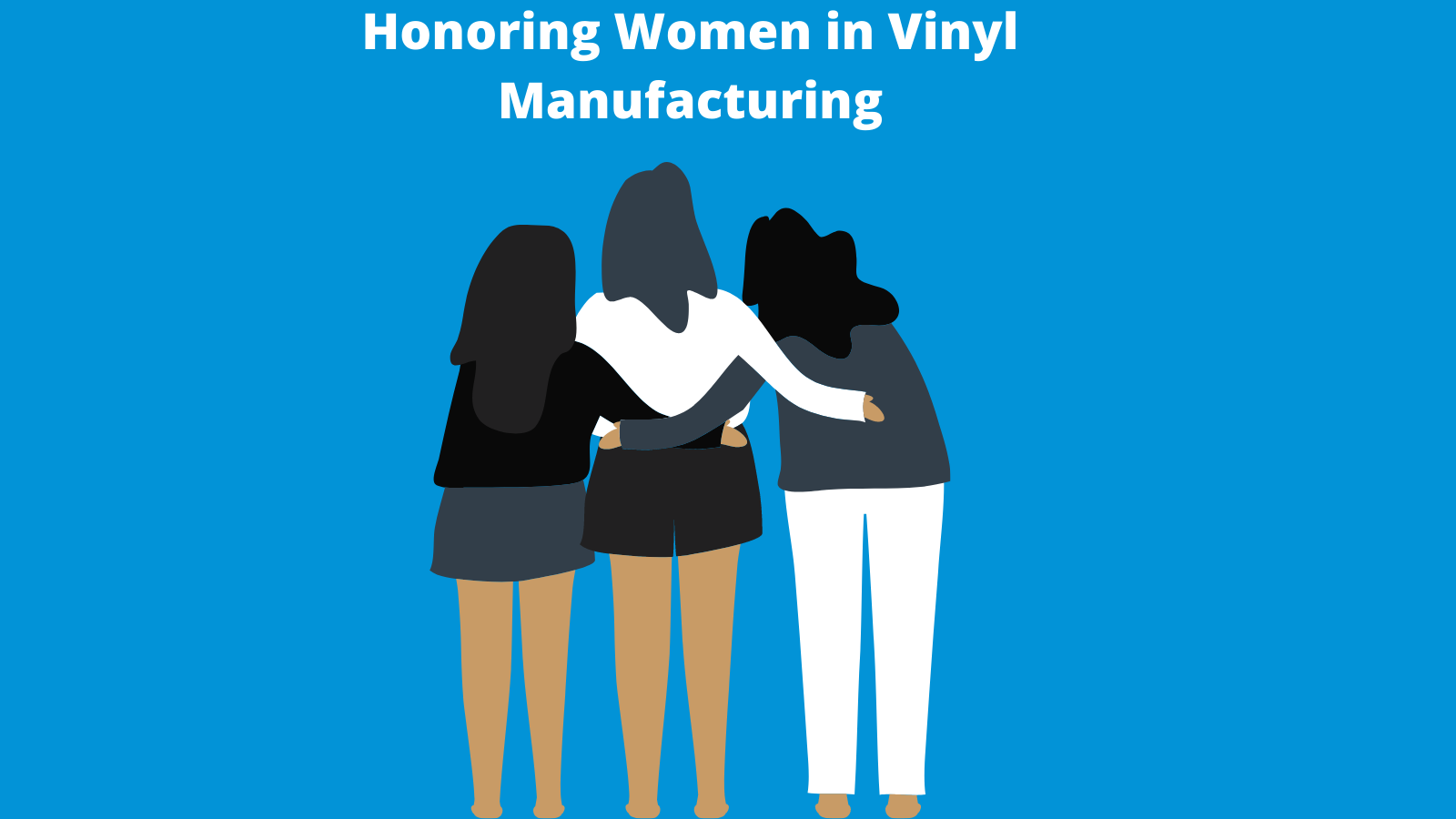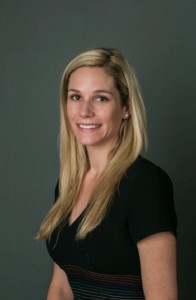
Honoring Women in Vinyl Manufacturing
In Honor of Women’s history month, the Vinyl institute is celebrating and recognizing some of the amazing women that work in our manufacturing industry. We asked them a few questions about how they got into manufacturing and below are some great answers to how they found their niche in the vinyl industry, and advice they have for others. (Know of a woman in the vinyl industry you would like us to celebrate and recognize? Please send us an email at mtozzie@vinylinfo.org)

Name: Alex Grover
Title: President
Company: i2M
Q: How did you choose this line of work?
A: I chose vinyl manufacturing because it presented an opportunity to make an impact. Vinyl is an incredibly important material – for our hospitals, for our homes, and for our infrastructure – but sustainability and circularity within the industry must continue to improve. As a flexible film manufacturer, I knew that i2M was uniquely positioned to not only manufacture these important vinyl products but also to develop solutions to repurpose them when they reached the end of their useful life. The opportunity to make an impact on both ends of a product life cycle challenges and energizes me every day. Working in manufacturing makes that possible.
Q: What are the benefits of having women in the manufacturing space?
A: I strongly believe that if everyone in the room is agreeing, there’s a problem. In my experience, the most successful businesses are the ones that embrace a culture of discussion, debate, and direct communication, and in order for that to happen, there has to be a diversity of thought. Adding women and others with diverse perspectives and experiences is the only way to make this a reality.
Q: What advice would you give to a young woman who is considering a career in the manufacturing sector?
A: Other than do it! There are two things I would suggest:
1) Be super curious – Asking questions when you’re new in any field – but especially one as process-driven as manufacturing – is key. No matter what role you start in, make it your mission to get a holistic view of the enterprise. Get up close and personal with the equipment (safely, of course!). Get a working knowledge of the products. Ask to do rotations in other departments. You’ll learn a ton and build rapport and connections across the business. Better yet, you’ll develop a “big picture” perspective which may mean you identify blind spots others have missed.
2) Own your strengths – You may have a different skill set than others on your team – and that’s a good thing! In fact, it could be a reason you get hired. When I first started my career in manufacturing, I felt pressure to fit into a “traditional” mold. It took time for me to realize that emulating everyone else wasn’t just a waste of my skill set – it might stymie i2M’s growth. I’ve learned a unique perspective or set of skills can unleash a whole new chapter of growth.
Q: What sparked your interest in math, science, sustainability, or engineering?
A: While I did have a stint as a competitive ‘mathlete’ (yes, that’s a real thing!), I wasn’t a terribly strong student in standard STEM fields. What I did have an interest in is how things worked. I enjoyed learning and researching. Most of all, I loved solving problems, which has been the skill I most frequently turn to in my current role at i2M. I think there is a misconception that to be successful in manufacturing, women have to be STEM-focused. While this is absolutely the case for specific roles, the most impactful individuals in manufacturing I’ve come across are driven, innovative, and action oriented. Regardless of educational experience, they apply practical skills and real-world experience to drive impressive manufacturing results.
Q: Was there anyone specific in your field that you admire?
A: I am fortunate to have an exceptional team at i2M, and I admire each member for the energy and creativity they bring each day.

Name: Amanda Cimaglia
Title: Vice President, ESG
Company: The Azek Company
Q: How did you choose this line of work?
A: I have been fortunate to spend most of my career working for companies whose values match my own, which has been intentional on my part. Joining AZEK has given me an opportunity to bring my passion for sustainability and social responsibility to a purpose-driven company that is leading by example in its industry – an industry that was brand new to me. My role was intentionally created to build upon AZEK’s strong reputation for innovation, excellence, and continuous improvement in support of our purpose to revolutionize outdoor living to create a more sustainable future. And, to me, AZEK is a company of the future – one that is acting with purpose and ambition today – and I wanted to be part of its journey.
Q: What are the benefits of having women in the manufacturing space?
A: Companies that are leading by example with respect to diversity, equity, and inclusion are well-positioned to attract and retain talent. Further, diversity (of all kinds) in the workplace has been proven to increase creativity, productivity, innovation, performance, and ultimately, competitiveness. That is certainly true in manufacturing, which has been historically male dominated
Q: What advice would you give to a young woman who is considering a career in the manufacturing sector?
A: Be curious, don’t be afraid to ask questions, and proactively seek out mentors and/or individuals that you admire. I am a better person and working professional because of the mentors I’ve had over my career – all of whom were more than willing to offer advice, provide guidance, sometimes push me outside of my comfort zone and open new doors.

Name: Kalli Stull
Title: TempRite Resin Area Leader
Company: Lubrizol
Q: How did you choose this line of work?
A: In high school, I went on a college visit to Purdue. I always enjoyed math but didn’t necessarily know what I would do with that as a career so my mom, with her sage mom wisdom, suggested that we check out one of the engineering information sessions. In the session, they talked about careers and highlighted the Co-Op program that would allow me to gain actual working experience as I completed my degree. I decided that day I was going to go to Purdue and be a Chemical Engineer.
Q: What are the benefits of having women in manufacturing?
A: I think women bring a diverse perspective that expands the lens from which we see and solve problems. At our plant, we really focus on Continuous Improvement, and it can be hard at times to come up with new ideas for a 50+-year-old process so having as much diversity of thought on your problem-solving team is critical to reaching new horizons.
Q: What advice would you give to a young woman who is considering a career in manufacturing?
A: Go for it! Reach out and look for opportunities to come and see manufacturing whether it is just job shadowing for a day or getting involved with an internship or Co-Op.
Q: What sparked your interest in math, science, sustainability, or engineering?
A: This may sound silly, but as a girl, I LOVED reading Nancy Drew mysteries. I’ve always enjoyed solving puzzles and engineering is a great career that brings together not only math and science to solve problems, but also for many problems, that creative side to get to the best solutions. Sustainability is something I’ve always been interested in, but I think my interest has intensified as I raise my own daughter and think about what kind of world, I want to leave for her.
Q: Was there anyone specific in your field that you admire
A: I’ve been fortunate to work in a plant that has had very strong female role models that I’ve been able to look to for advice and guidance.
Q: What kind of education and certifications did your line of work require?
A: I have a BS in Chemical Engineering from Purdue and an MBA from Bellarmine University.

Name: Peggy Schipper
Title: Sr. Sales Associate
Company: Performance Additives
Q: How did you choose this line of work?
A: I would have to say that it actually chose me. In college, I focused on playing basketball at Penn State and got a BS in Nutrition (medical dietetics) “on the side” because I loved sports, health, and biology. Unfortunately, there weren’t too many options for nutritionists at that time and so after a brief stint in the first woman’s pro basketball league, I decided to go back to school to become a chemical engineer. I had four chemists in my family and while I vowed never to become one, I always seemed to drift in that direction. That morphed into an MS in Polymer Science and after scouting the newspapers for a job after graduation (LOL, no LinkedIn back then), I wound up answering an ad for a Laboratory Supervisor at American Hoechst. That led me into working on developing PVC lubricants and from there my career just seemed to take a on a life of its own down the PVC Additives path. It was interesting and there was always a new challenge! At this point in time, I’ve worked for every size company, including public, family-owned, and private equity-owned organizations. Each has its own set of challenges and opportunities.
Q: What are the benefits of having women in manufacturing?
A: The benefit of having women in any field is diversity. Diversity of thought brings about better results in any endeavor. Plus, we’re used to working our butts off. We raise children.
Q: What advice would you give to a young woman who is considering a career in manufacturing?
A: Embrace the science and technology of it all and never stop looking for ways to manufacture better products. Also, be very proud of the fact that you actually make things that contribute to people’s lives.’
Q: What sparked your interest in math, science, sustainability, or engineering?
A: I had four chemists in my family growing up, but I have to say that my aunt, who was a Ph.D. organic chemist at a time when there were very few women getting Ph.D.’s in chemistry, was inspirational in helping me to see that I could accomplish anything I wanted to in a STEM field. Her husband was a Professor of Quantum Chemistry at Washington University his entire career. I also had another aunt and uncle who worked for Pharma companies on interesting projects. So, I had a lot of role models for careers in STEM fields. And then I had wonderful parents who encourage me to further my education in one of those fields.
Q: Was there anyone specific in your field that you admire
A: Yes. This has to be Sylvia Moore of Shin-Tech. Sylvia showed that women could rise through the ranks into upper management in a PVC manufacturing company at a time when there were none. Everyone in the PVC industry knows who she is, and she has a wealth of knowledge due to her diverse experience. She truly broke the glass ceiling in an extremely male-dominated field at the time.
Q: What kind of education and certifications did your line of work require?
A: I started with an MS in Polymer Science. Since I hung around with a lot of Chemical Engineers, working on projects, everyone assumed that I was one, so you might say that I have an honorary engineering degree. . If you want to get smarter, it’s important to hang around the right people, and everyone at Arkema, where I was for over 20 years, was a chemical engineer and really smart. . On the technology side, I had some incredible mentors and bosses. When I decided to try the business side, I got an MBA in Chemical Studies from Fairleigh Dickinson University. And in the end, being an athlete on a team sport in college prepared me quite a bit for my career. Being able to work on a team is so important.

Name: Sylvia Moore
Title: Director of Technical Development
Company: Shintech
Q: How did you choose this line of work?
A: I just fell into plastics –I was looking for a job in a small town without much opportunity for my education and CertainTeed Corporation asked if I would work in their Research lab. There was only one right answer.
Q: What are the benefits of having women in manufacturing?
A: For me being one of the first in the technical arena everyone remembered me and were very kind and helped me learn and helped me find solutions to problems that we had. It is an excellent way to make a living and provide for the family. There is a lot of upward growth for women should they choose to learn to be a manager.
Q: What advice would you give to a young woman who is considering a career in manufacturing?
A: Have a well-rounded education- have the basics in physics, chemistry and biology. Each of those disciplines have attributes that help solve problems. Mechanical engineering is very helpful as all things in manufacturing have a mechanical component.
Q: What sparked your interest in math, science, sustainability, or engineering?
A: It was the space age when I was in high school and those good in the sciences had what appeared to be an opportunity for a good job. At that time, it was very limited to what women traditionally did
Q: Was there anyone specific in your field that you admire
A: There is a long list of pioneers in the PVC industry that took the time to teach me what I needed to know. I was not shy about asking how things worked or why they worked. My college education taught me how to do research and think for myself. Peter Heilmayr the VP of Research at CertainTeed has my greatest admiration. A wonderful teacher. We stayed friends until his death. He taught me something every time I asked and was always so kind to help me and answer my phone call. He with a couple of other gentlemen designed the first twin-screw extruder. He understood all aspects of manufacturing PVC products from making resin through to loading the finished product on a truck to go to the consumer.
Q: What kind of education and certifications did your line of work require?
A: My best asset was that I grew up on a ranch and at an early age learned how to fix equipment and solve problems. The research tools learned in college helped me to when it came to growing the PVC businesses, I have been involved in. One must be curious; one must want to learn every day. I have had to re-engineer myself several times over. I wish that I had had more management of people training. Today they offer those courses. The internet makes it much easier to grow and learn. Value the people who are experts and learn all you can from them. If marketing interests you, you at least take the basic science classes so you can understand the science and manufacturing side of things. Understand the basics of marketing if you want to work in a plant so you can communicate with the sales and marketing staff. It is a team that makes the company prosper.
